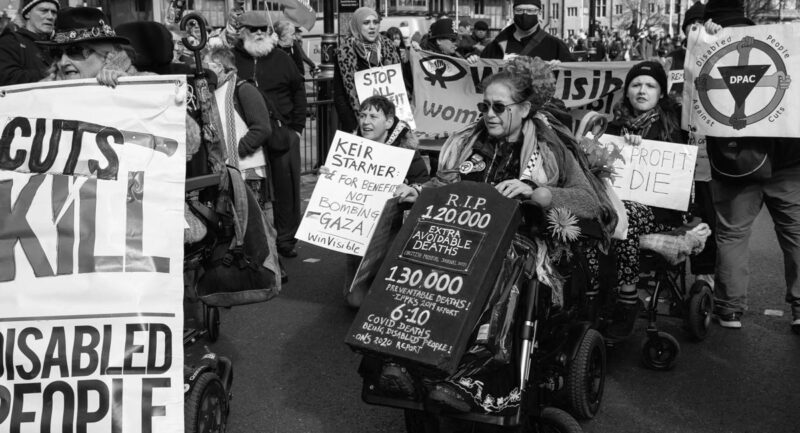Spain rises up against austerity
This autumn the epicentre of struggle against savage austerity has moved from Greece to Spain. KD Tait examines the potential for halting the attacks and the strategy needed to do this.
 Hundreds of masked, black-clad police advance, firing rubber bullets into the backs of fleeing protestors. In a side street young people confront vans of riot police behind a blazing barricade.
Hundreds of masked, black-clad police advance, firing rubber bullets into the backs of fleeing protestors. In a side street young people confront vans of riot police behind a blazing barricade.
These were the streets of Madrid as Spain’s government announced a further £8billion of cuts to education, health and welfare spending in next year’s budget.
Spain’s pro-cuts government is taking Greece’s place as the eye of the storm. Millions turned out for three demonstrations in five days against wave after wave of cuts that are destroying jobs and communities with the aim of boosting profits for the rich.
Cuts don’t work
Years of austerity have been a disaster for Spain. The latest protests come after £22 billion was slashed from this year’s budget and a further £8 billion of cuts were announced for next year’s. On top of this, the £50 billion EU bailout of Spain’s banks will be paid for by millions of Spanish workers through cuts in jobs and pay.
More than 100,000 public sector workers have already been sacked. Total unemployment is above 25 per cent. Those who remain are enduring a third year of pay freezes, while workload intensifies as fewer employees attempt to compensate for the shortfall.
With youth unemployment pushing 55 per cent, there is no shortage of the angry, young and poor ready to defy the police curfews. During the “Occupy Congress” demonstration on 25 September, thousands of youthful indignados abandoned their previous peaceful tactics and tried to storm the police barriers shielding Spain’s political elite.
After the months of bitter struggle by miners and their communities to defend their jobs, the increasing violence of the protests reveals growing anger, against premier Mariano Rajoy and his right-wing government but also frustration at the failure of the political and trade union leadership of the working class to organise genuine resistance.
Crisis of leadership
In Spain, as elsewhere, union leaders have stuck to a series of limited one day protest strikes and mass demonstrations, each followed by a long periods of inaction – a strategy which can only lead to defeat. Desperate to maintain their privileged positions as go-betweens for the working class, the government and the employers, reformist union bosses and politicians alike have exercised a dampening effect on these protests. Why? To demonstrate the invaluable service they can render to the bosses and extract some limited concessions that will save their face. Some hope!
Given the severity of this crisis this will mean nothing less than negotiating away decades of hard-won employment rights, public services and the rights of workers, youth, women, national minorities and immigrants.
Insecurity, flexibility and profitability are the objectives of endless cuts. If the privileged leaders of the working class are too compromised by their association with the bosses, then we need to fight for the working class to build truly independent, accountable bodies capable of co-ordinating and leading action.
Nor does the Occupy movement, as it stands, offer any strategy which points the way forward. Occupying squares, besieging the parliament may involve militant sections of the unemployed and youth for more extended periods than a one-day strike or mass demonstration. But it does not address the question: how do we get rid of the government that is imposing these cut? It may give a feeling of empowerment but it does not give people power. The limits of direct action, violent as well as non-violent, have been demonstrated in Greece for three years, in the USA by the Occupy Movement, in Spain itself over the last twelve months.
As Greece showed in June the struggle is above all a political one – the austerity governments must be driven from power. For that we need assemblies – yes. More than that we need committees of action, elected in the workplaces but also in the squares and the communities blighted by unemployment, to plan and organise a general strike. We need to draw in the immigrant workers, defending them against police and right wing attack.
But we also need parties – parties of the class struggle – ones not afraid to say openly, “We are fighting for power, power to change the world, to end the exploitation and austerity of capitalism for good.”
With such organisations it would be possible to launch not just a one-day protest strike but an all-out indefinite general strike to smash the austerity programme and drive out Rajoy and his reactionary party. It will then be possible to pose the question to all the parties and unions that have fought in the struggle – unite to create a workers’ government to make the rich pay for their crisis and provide jobs and restore services on the road to a socialist Spain.
Not separation but socialist revolution
The Spanish right wing government is besieged from all sides. It faces a deepening political crisis, as the central government proves unable or unwilling to rescue bankrupt regional governments.
The million-strong demonstration for Catalan independence in Barcelona on 11 September reveals the growth of secessionist ideas as both a rejection of Spanish state austerity, and a popular desire for greater democratic control.
In reality the goal of an independent and prosperous capitalist Catalonia is a pipe dream. Wrapped in populist and even left wing slogans, its foundations lie in the naked interest of the region’s wealthy bosses, who don’t want to see their profits used to subsidise poorer areas. A new, tiny country would be even weaker against the ravages of the international capitalist speculators and bond-markets. The economic price would be the sacrifice of public services.
The reaction of the Spanish military – “We will do everything to protect the integrity of the Spanish state” – is an ugly reminder of the role the army generals played in defending Franco’s dictatorship. The Catalans and the Basques should have the right to determine whether to stay as part of the Spanish state – that is the most elementary democracy and it is a sign of how incomplete the democratisation of the 1970s was that it can be rudely rejected by Rajoy and Franco’s successor party, Partido Popular.
If the non-Castilian peoples of the Spanish state democratically vote to secede, the entire Spanish workers’ movement must support them. But for socialists this separation should not be our goal.
![]() The future of Spanish workers lies with one another and with all the workers of Europe. But the undemocratic imperialist EU is a bosses’ club, which exists to defend the common interests of Europe’s ruling class. The crisis has exposed it as a naked instrument of class rule. That’s why we must fight for a socialist Spain in a Socialist United States of Europe.
The future of Spanish workers lies with one another and with all the workers of Europe. But the undemocratic imperialist EU is a bosses’ club, which exists to defend the common interests of Europe’s ruling class. The crisis has exposed it as a naked instrument of class rule. That’s why we must fight for a socialist Spain in a Socialist United States of Europe.









